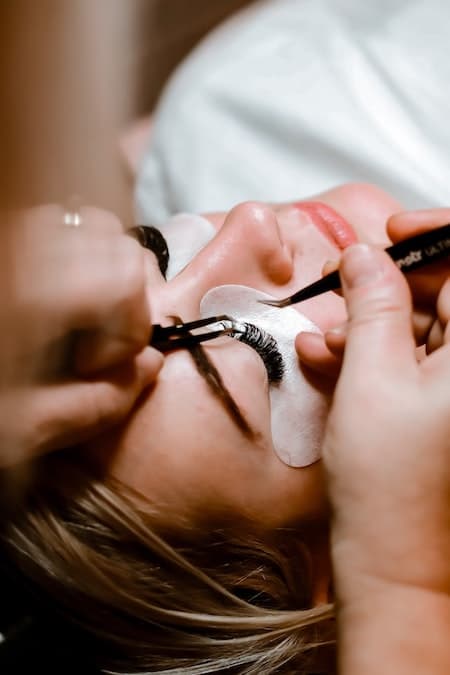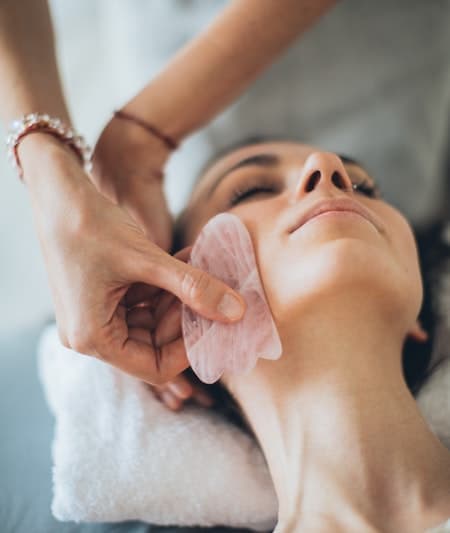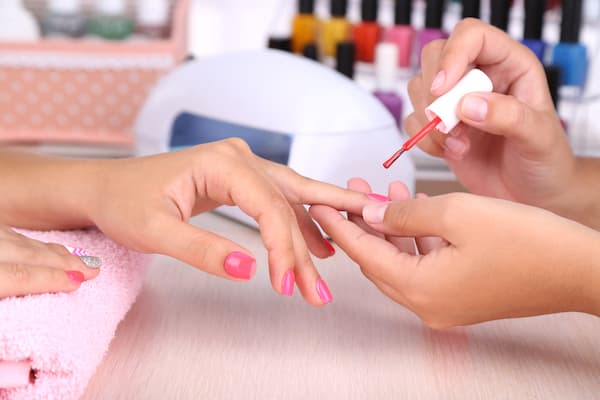The Good And Bad Effects Of Salt Water For Your Hair
Salt water is a natural ingredient that is commonly found in the ocean, and it has immense benefits for hair.
However, a lot of people beeve that ocean water is damaging, and that’s not always the case.
Salt water actually has some antifungal properties that can be quite beneficial for both your hair and scalp.
So, if you love the beach and taking a dip in the sea water every so often, no need to fear!
Here are a few of the positive effects salt water can have on your hair.
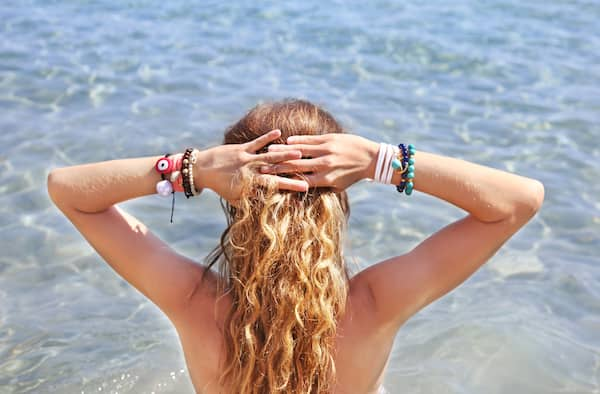
Benefits of Salt Water for Hair
1. Can Remove excess oil
If you suffer from excess sebum, a flaky scalp, or oily hair, you know how frustrating it is.
Typically, people with thin and/or straight hair are more prone to having greasy hair, but it can affect just about anyone.
Salt water can help to remove the excess oil which can lead to healthier hair growth and keep you from the greasy look.
2. Increase in blood flow
The salt in the water can also increase blood flow to the scalp, which can help promote healthy hair growth.
If you’ve ever felt like your hair didn’t grow as quickly as it should, or if you’ve struggled with hair loss, dipping into the salt water just might do the trick.
3. Can remove dead skin cells
As we all know, exfoliation can help to get rid of dead skin cells.
When it comes to your hair, it can also help to unclog hair follicles and promote healthy hair growth.

4. Increases Volume
If you’re of the fine or flat hair type (or both, like me, sadly) you know the struggle of getting some volume.
I can say this from experience – it’s not easy. No matter what product or hot tool I use, nothing seems to work quite like a day at the beach.
So, the next time you head to the beach, bottle some of that salty water into a little spray bottle and give yourself an easy way to get that voluminous look. After all, there’s a reason they’re called beach waves!
Alternatively, if you don’t live near the beach (boo!) you can still get the same results from mixing a few tablespoons of sea salt with water.
Just give it a good shake then apply it to your hair.
A few sprays and voila! You’ve got the locks you’ve always dreamed of!
5. Provides Essential Nutrients
The high concentration of minerals in salt water makes it an excellent source of essential nutrients for hair.
The minerals in salt water include magnesium, calcium, and potassium, which are essential for healthy hair growth.
6. Removes Product Buildup
If you regularly use hair products, there’s a chance you don’t always get rid of them 100%.
Sea salt water can help to remove product buildup from the hair, which can also lead to greasy hair and a flaky scalp.

Negative Effects of Salt Water on Hair
While salt water has several benefits for hair, it can also have some negative effects.
1. Dry hair
Saltwater can have a drying effect on hair and can cause hair strands to become brittle, which can lead to split ends and hair breakage.
2. Hair Cuticle Damage
Additionally, salt water can damage the hair cuticle, which can make the hair more susceptible to damage from harsh chemicals and heavy oils.
However, it is quite simple to avoid this by simply using only 2 parts sea salt to 8 parts water (if making your own spray of course).
How Salt Water Affects Different Hair Types
Salt Water for Curly Hair
If your natural hair is curly, you’re already more prone to frizz and dryness, and saltwater can exacerbate these issues.
Curly hair types may also experience more tangling and difficulty detangling after exposure to salt water.
To combat these issues, it is recommended that those with curly hair types use a leave-in conditioner or hair oil before going into the salt water.
This can help to protect the hair from the drying effects of the salt water and keep it feeling soft and manageable.

Salt Water for Straight Hair
Straight hair types may benefit from the texture-enhancing effects of salt water.
The salt in the water can actually create a natural wave or curl in straight hair, giving it more body and volume.
Salt Water for Fine Hair
Fine hair types may find that salt water can add volume and texture to their hair.
It is recommended that those with fine hair types use a clarifying shampoo after exposure to salt water to remove any build-up and keep the hair feeling light and fresh.
Salt Water for Wavy Hair
Similar to straight hair types, those with natural waves may also find that salt water gives their hair a bit more texture.
But the same thing is true for dryness. Using a moisturizing conditioner with ingredients such as shea butter and argan oil is recommended.
Just like those with curly hair, people with wavy hair may also experience more tangling and difficulty detangling after exposure to salt water.
It’s important to use a wide-tooth comb or detangling brush, as well as a leave-in conditioner to avoid breakage.
Using Salt Water for Beachy Waves
How to Make Natural Sea Salt Spray
To achieve beachy waves, one can use natural sea salt spray, and making your own is easy and cost-effective.
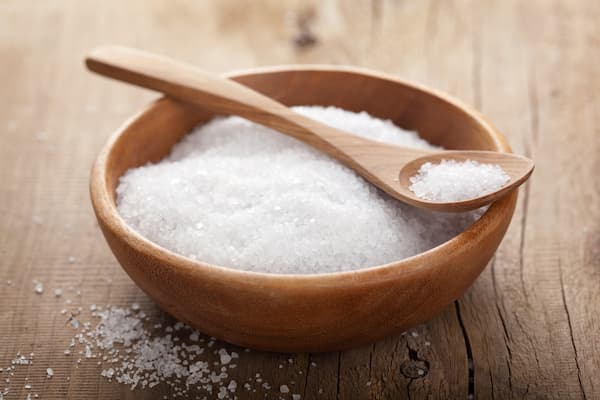
To make sea salt spray with natural ingredients, mix warm water and sea salt in a spray bottle, as mentioned earlier.
For added moisture, add a few drops of your favorite hair oil. We love THIS ONE.
How to Use Salt Water for Beachy Waves
To use salt water for beachy waves, you should start with damp hair.
First, spray the natural sea salt spray onto the hair, focusing on the mid-lengths and ends. Never apply it directly to hair shafts.
After spraying, scrunch the hair to create texture. For best results, let your hair air dry or use a diffuser to dry your hair on a low heat setting.

Alternatives to Salt Water for Beachy Waves
If you don’t have access to salt water, there are other alternatives to achieve the beach hair look.
A texturizing spray like this one or a hair mask that contains sea salt is a great option.
Additionally, you can easily create beachy waves by braiding damp hair and leaving it to dry overnight.
How to Protect Your Hair from Salt Water Damage
Preventative Measures
To prevent salt water damage to your hair, there are a few things you can do before hitting the beach or pool.
- Use a leave-in conditioner with natural ingredients coconut oil or olive oil. These oils can help protect your hair from the drying effects of salt water.
- Use a natural shampoo that is gentle on your hair and scalp. Harsh shampoos can strip your hair of its natural oils, leaving it more vulnerable to damage.
- Consider using essential oils like lavender or rosemary to promote a healthy scalp and hair growth.

Post-Swim Hair Care Routine
After swimming in salt water, it’s important to take care of your hair to prevent damage.
The first step is to rinse your hair with fresh water to remove any salt or chlorine.
Next, apply a leave-in conditioner or hair product to help restore moisture to your hair.
If you have a healthy scalp, consider giving yourself a scalp massage to stimulate blood flow and promote hair growth.
You can also use a natural exfoliator like brown sugar or sea salt to gently remove any buildup on your scalp.
In addition to these steps, it’s important to avoid brushing wet hair, as this can cause breakage.
Rather than brushing soaking wet hair, wait until it’s damp and then use a comb to get rid of any knots.
Frequently Asked Questions
Can you leave salt water in your hair overnight?
It is not recommended to leave salt water in your hair overnight as it can cause dryness and damage to your hair.
Rinse your hair thoroughly with fresh water after using salt water.
Is salt water good for hair growth?
While salt water can help to exfoliate the scalp and remove dead skin cells, there is no scientific evidence to suggest that it promotes hair growth.
Is salt water good for your skin?
Salt water can be beneficial for the skin as it helps to remove toxins and dead skin cells.
However, it can also be drying, so it is important to moisturize your skin after exposure to salt water and to speak with your doctor about any skin conditions you may have.
What happens if we apply salt on hair?
Applying salt crystals directly to your hair can cause dryness and damage. The best way to use salt for your hair is to dilute it first with water.
Conclusion
Overall, salt water can be a great natural ingredient to incorporate into your hair care routine, as long as it’s used in moderation and the proper steps are taken to protect the hair.
This can include using a leave-in conditioner before swimming, rinsing the hair with fresh water after swimming, and avoiding harsh chemicals and heavy oils that can further damage the hair.
Salt water can have an antibiotic effect on the scalp, thanks to its high concentration of minerals and amino acids, which can help to keep the scalp healthy and free from infections.
Additionally, salt water has anti-fungal properties that can help to prevent dandruff and other scalp conditions.
Salt water can also help to improve blood circulation in the scalp, which can promote hair growth and improve the overall health of the hair. It contains essential nutrients that can nourish the hair and keep it healthy and strong.
Just remember, salt water can be a double-edged sword if the proper precautions aren’t taken.
As always, it is recommended to consult with a professional before trying any new hair care routine.
Hopefully, this article has helped you get ready for all your upcoming beach vacations and days at the pool!
Other Posts You Might Like:
